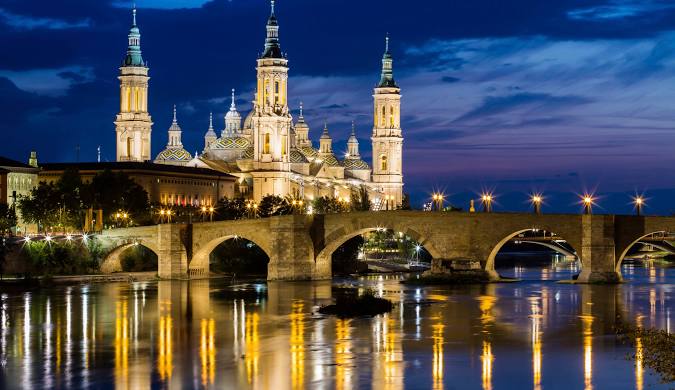Zaragoza , Spain
🇪🇸 Discover Zaragoza: Spain’s Hidden Gem of History, Art & Flavor
🏰 Why Zaragoza Deserves a Spot on Your Spain Bucket List
Looking for a Spanish city that blends ancient history, bold architecture, local food, and a vibrant cultural pulse—without the tourist crowds?
Zaragoza is the answer.
Nestled between Madrid and Barcelona, this underrated Aragonese capital will surprise you at every turn. From its Moorish palaces to Goya masterpieces, and from lively tapas alleys to grand riverfront basilicas, Zaragoza is full of magic waiting to be explored.
🌟 Top Things to Do in Zaragoza
🕍 1. Marvel at the Basílica del Pilar
-
A riverside icon with colorful domes and frescoes painted by Goya.
-
Climb the tower for a panoramic view of the city and the Ebro River.
🏰 2. Step Into the Aljafería Palace
-
A 10th-century Moorish fortress with Islamic arches and hidden gardens.
-
Later used by Catholic monarchs—this place is literally layered in history.
⛪ 3. Visit La Seo Cathedral
-
A masterpiece of Gothic, Renaissance, and Mudéjar styles.
-
Less famous than El Pilar, but equally stunning—don’t miss the tapestry museum inside.
🌉 4. Sunset from the Stone Bridge
-
For postcard-perfect views of Zaragoza and El Pilar, this is the spot.
-
Especially beautiful at golden hour or lit up at night.
🎨 Walk in Goya’s Footsteps
Zaragoza is the birthplace of Francisco de Goya, one of Spain’s most famous painters. Visit:
-
The Goya Museum
-
Churches with his original frescoes
-
Public squares and murals that celebrate his legacy
🍷 Taste of Zaragoza: What to Eat
Zaragoza’s food scene is rich, bold, and rooted in tradition.
Must-Try Dishes:
-
🐑 Ternasco de Aragón – Roasted young lamb
-
🐟 Bacalao Ajoarriero – Salted cod with garlic and peppers
-
🥘 Stews a la Chilindrón – Perfect comfort food
-
🍷 Wash it down with wine from Cariñena, a top local region
🌮 Head to El Tubo for the ultimate tapas crawl—a buzzing maze of tiny bars, bites, and good vibes.
🎉 Festivals Worth Planning Around
-
Fiestas del Pilar (October): Zaragoza’s biggest event—think flower offerings, fireworks, parades, and parties across the city.
-
Semana Santa (Holy Week): Deeply traditional and visually stunning processions.
🚄 Easy to Reach, Hard to Forget
📍 Getting There:
-
Just 1.5 hours by high-speed train from Madrid or Barcelona
-
Well-connected and walkable city
💶 Great value:
-
Affordable hotels, meals, and attractions—ideal for budget-conscious travelers
-
🔍 More Cool & Lesser-Known Facts About Zaragoza
🏛️ 1. Zaragoza Has Roman Roots
-
Founded as Caesaraugusta by the Romans in 14 BC.
-
You can still visit well-preserved Roman remains:
-
Teatro Romano – An ancient Roman theater right in the city center.
-
Museo del Foro – Underground museum showing the old Roman forum.
-
Museo del Puerto Fluvial – Ancient Roman river port and trade center.
-
-
It’s one of the few cities in Europe with all four major Roman public buildings still intact.
🕌 2. Unique Mudéjar Architecture (UNESCO)
-
Mudéjar style = Islamic artistry mixed with Christian design.
-
You’ll find intricate brickwork, wooden ceilings, and geometric tiles in places like:
-
La Seo Cathedral
-
Church of San Pablo
-
Aljafería Palace
-
-
Zaragoza is part of the Mudéjar Architecture of Aragon UNESCO World Heritage Site.
🎭 3. Rich Theatre and Arts Scene
-
The Teatro Principal (Main Theater) hosts ballet, drama, and music in a grand 18th-century building.
-
Street art tours are gaining popularity—Zaragoza has become a hub for urban murals and creative graffiti.
🛍️ 4. Unique Shopping
-
Zaragoza’s local markets and boutique shops are full of charm:
-
Mercado Central – Historic market hall for fresh produce, meats, and cheeses.
-
Calle Alfonso I – Pedestrian shopping street with stunning views of El Pilar.
-
Handmade ceramics, leather, and embroidered textiles are popular souvenirs.
-
🌳 5. Green Spaces & Nature
-
The Parque Grande José Antonio Labordeta is a massive city park perfect for walking, biking, and picnics.
-
Ebro River Walks – Scenic promenades and bridges along the river, ideal for sunsets or a calm morning stroll.
-
You can also rent bikes and cruise the Canal Imperial de Aragón.
🏞️ 6. Perfect Base for Day Trips
-
Monasterio de Piedra – A beautiful waterfall-filled natural park with a historic monastery (about 1.5 hrs away).
-
Belchite – A haunting and fascinating ghost town destroyed in the Spanish Civil War.
-
Tarazona – A nearby town with colorful Mudéjar buildings and a unique octagonal bullring.
🕯️ 7. Local Legends & Mysteries
-
Zaragoza has a strong tradition of folklore and saints, like:
-
The Legend of El Pilar: The Virgin Mary is said to have appeared to Saint James here in 40 AD—the first Marian apparition in history.
-
Stories of haunted monasteries and mystic saints that locals love to share.
-
📅 8. Zaragoza Expo 2008 Legacy
-
Zaragoza hosted the World Expo 2008, themed around water and sustainable development.
-
Today, you can visit the Expo Zone with futuristic architecture, parks, and the Bridge Pavilion by Zaha Hadid.
🧠 Fun Trivia
-
Locals are called "Zaragozanos" or nicknamed "Maños."
-
The city has its own dialect influence—"maño" Spanish includes unique words and intonation.
-
Zaragoza has a deep connection to military history—known for its resistance during the Napoleonic Wars.
-
💬 Final Word: Why Zaragoza?
If you love discovering less-touristy destinations full of heart, soul, and history—Zaragoza is calling.
A place where Romans, Moors, and modern Spaniards have all left their mark, and where every meal and monument feels personal.
📸 Ready to Fly All Over Spain?
Add Zaragoza to your itinerary—you won’t regret it.


